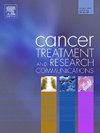Efficacy and safety of immunotherapy in real-world patients with advanced non-small cell lung cancer
IF 2.4
Q3 Medicine
引用次数: 0
Abstract
Objective
The aim of this study was to explore the predictors of immunotherapy efficacy for advanced non-small cell lung cancer (NSCLC) in the real world and to analyze the clinical efficacy and safety of patients receiving immunotherapy for advanced NSCLC.
Methods
Clinical pathological data from patients diagnosed with advanced NSCLC treated with immune checkpoint inhibitors (ICIs) were collected. Survival analysis and differential efficacy comparison of progression-free survival (PFS) was performed using the Kaplan-Meier method and Log-rank test. Univariate and multivariate analyses of PFS and objective response rate (ORR) were performed by Cox proportional risk regression models and logistic regression models to explore influence factors associated with the prognosis of immunotherapy.
Results
(1) Overall, the median PFS (median PFS, mPFS) for 237 patients was 11.3 months (range: 8.5-14.1), the ORR was 55.7 %. Univariate and multivariate analyses of PFS in the overall population found that age ≥65 years, Eastern Cooperative Oncology Group (ECOG) physical status (PS) score of 0-1, clinical stage III, absence of liver metastases, immunotherapy combined with chemotherapy and prognostic nutritional index (PNI) ≥47.8 were independent predictors of longer PFS in immunotherapy-advanced NSCLC. Univariate and multifactorial logistic regression analysis of ORR in 237 patients suggested that ECOG PS score, number of ICI lines and prognostic nutritional index (PNI) were independent influence factors of ORR.
(2) In the "stage IV, first-line, ECOG PS 0-1" subgroup, 106(106/237)patients had an mPFS of 10.9 months (range: 9.6-12.2) and an ORR of 59.4 %. Univariate and multivariate analyses of PFS in subgroups found that liver metastases, immunotherapy combined with chemotherapy and PNI were independent influencers of PFS. A univariate analysis of ORR found that only High-PNI was associated with longer PFS.
(3) Additional factors affecting the efficacy were explored. A subgroup analysis among 64 (64/237) patients with accessible programmed death-ligand 1 (PD-L1) expression levels showed a trend towards a PFS benefit in patients with PD-L1 tumor cell proportion score (TPS) ≥ 50 % and TPS < 1 % compared to patients with PD-L1 TPS < 1 % (p=0.196); A subgroup analysis among 91 (91/237) patients with traceable genetic test results showed that patients with positive driver genes (KRAS/MET/RET/HER2/EGFR/ALK) had a shorter PFS than patients with negative driver genes (HR=1.712, 95 % CI: 0.994-2.947, p=0.048); Subgroup analyses of efficacy assessment showed significantly prolonged PFS in patients with an initial or best outcome assessment of complete response (CR) or partial remission (PR) compared with stable disease (SD) or progressive disease (PD) (P < 0.001).
(4) Immune-related adverse events (irAEs) requiring pharmacological intervention or discontinuation were recorded. 61 (61/237) patients experienced irAEs during treatment. Grade 1∼2 adverse reactions occurred in 27.8 % of patients and grade ≥3 adverse reactions in 3.8 % of patients. There was no statistical difference in the occurrence (P=0.728) and severity (P=0.612) of adverse events between the ICIs.
Conclusion
This study reports the practical experience of ICIs in the treatment of NSCLC in China by analyzing the efficacy and safety of real-world advanced NSCLC treated with ICIs. The results were generally consistent with those of clinical trials, and the factors with the greatest impact on the efficacy of ICIs were ECOG PS, clinical stage, and PNI. Therefore, physicians can predict the future benefit of immunotherapy for NSCLC based on clinical prognostic indicators and make individualized treatment choices.
免疫治疗在现实世界晚期非小细胞肺癌患者中的疗效和安全性
目的探讨现实世界中晚期非小细胞肺癌(NSCLC)免疫治疗疗效的预测因素,分析晚期非小细胞肺癌患者接受免疫治疗的临床疗效和安全性。方法收集经免疫检查点抑制剂(ICIs)治疗的晚期NSCLC患者的临床病理资料。采用Kaplan-Meier法和Log-rank检验进行生存分析和无进展生存期(PFS)差异疗效比较。采用Cox比例风险回归模型和logistic回归模型对PFS和客观缓解率(ORR)进行单因素和多因素分析,探讨影响免疫治疗预后的相关因素。结果(1)237例患者的中位PFS(中位PFS, mPFS)为11.3个月(范围8.5 ~ 14.1),ORR为55.7%。总体人群PFS的单因素和多因素分析发现,年龄≥65岁,东部肿瘤合作组(ECOG)身体状态(PS)评分0-1,临床III期,无肝转移,免疫治疗联合化疗和预后营养指数(PNI)≥47.8是免疫治疗晚期NSCLC PFS延长的独立预测因素。237例患者的单因素和多因素logistic回归分析显示,ECOG PS评分、ICI线数和预后营养指数(PNI)是影响ORR的独立因素。(2)在“IV期,一线,ECOG PS 0-1”亚组中,106例(106/237)患者的mPFS为10.9个月(范围:9.6-12.2),ORR为59.4%。亚组PFS的单因素和多因素分析发现,肝转移、免疫治疗联合化疗和PNI是PFS的独立影响因素。单变量ORR分析发现,只有高pni与较长的PFS相关。(3)探讨了影响疗效的其他因素。对64例(64/237)程序性死亡配体1 (PD-L1)可及表达水平患者的亚组分析显示,PD-L1肿瘤细胞比例评分(TPS)≥50%和TPS <的患者有PFS获益的趋势;与PD-L1 TPS和lt患者相比;1% (p=0.196);对91例(91/237)可追溯基因检测结果的患者进行亚组分析发现,驱动基因(KRAS/MET/RET/HER2/EGFR/ALK)阳性患者的PFS短于驱动基因阴性患者(HR=1.712, 95% CI: 0.994 ~ 2.947, p=0.048);疗效评估的亚组分析显示,与疾病稳定(SD)或疾病进展(PD)相比,初始或最佳结局评估为完全缓解(CR)或部分缓解(PR)的患者PFS显著延长。(4)记录需要药物干预或停药的免疫相关不良事件(irAEs)。61例(61/237)患者在治疗期间发生了irae。27.8%的患者发生1 ~ 2级不良反应,3.8%的患者发生≥3级不良反应。两组不良事件发生率(P=0.728)和严重程度(P=0.612)比较,差异无统计学意义。结论本研究通过分析现实世界晚期NSCLC使用ICIs治疗的疗效和安全性,报道了ICIs在中国治疗NSCLC的实践经验。结果与临床试验结果基本一致,对ICIs疗效影响最大的因素为ECOG PS、临床分期、PNI。因此,医生可以根据临床预后指标预测非小细胞肺癌免疫治疗的未来获益,并做出个性化的治疗选择。
本文章由计算机程序翻译,如有差异,请以英文原文为准。
求助全文
约1分钟内获得全文
求助全文
来源期刊

Cancer treatment and research communications
Medicine-Oncology
CiteScore
4.30
自引率
0.00%
发文量
148
审稿时长
56 days
期刊介绍:
Cancer Treatment and Research Communications is an international peer-reviewed publication dedicated to providing comprehensive basic, translational, and clinical oncology research. The journal is devoted to articles on detection, diagnosis, prevention, policy, and treatment of cancer and provides a global forum for the nurturing and development of future generations of oncology scientists. Cancer Treatment and Research Communications publishes comprehensive reviews and original studies describing various aspects of basic through clinical research of all tumor types. The journal also accepts clinical studies in oncology, with an emphasis on prospective early phase clinical trials. Specific areas of interest include basic, translational, and clinical research and mechanistic approaches; cancer biology; molecular carcinogenesis; genetics and genomics; stem cell and developmental biology; immunology; molecular and cellular oncology; systems biology; drug sensitivity and resistance; gene and antisense therapy; pathology, markers, and prognostic indicators; chemoprevention strategies; multimodality therapy; cancer policy; and integration of various approaches. Our mission is to be the premier source of relevant information through promoting excellence in research and facilitating the timely translation of that science to health care and clinical practice.
 求助内容:
求助内容: 应助结果提醒方式:
应助结果提醒方式:


